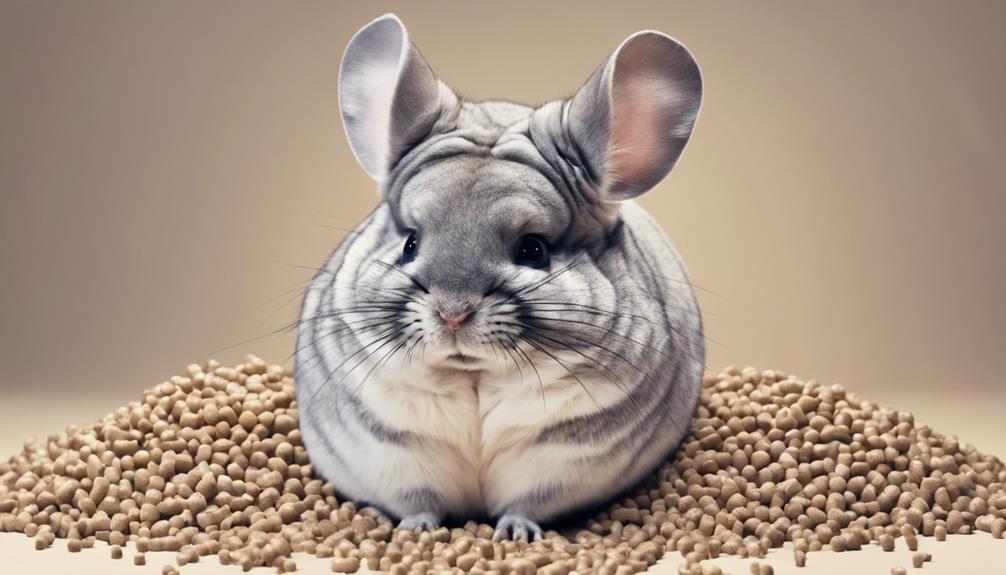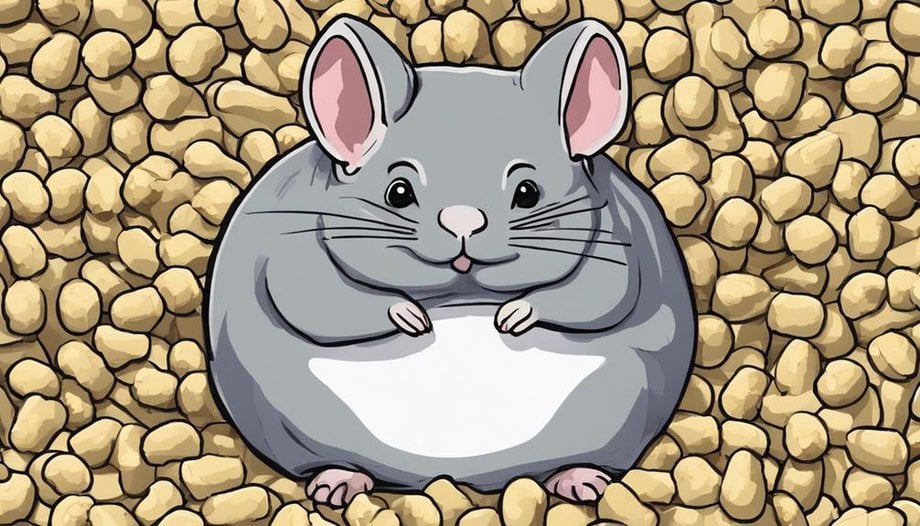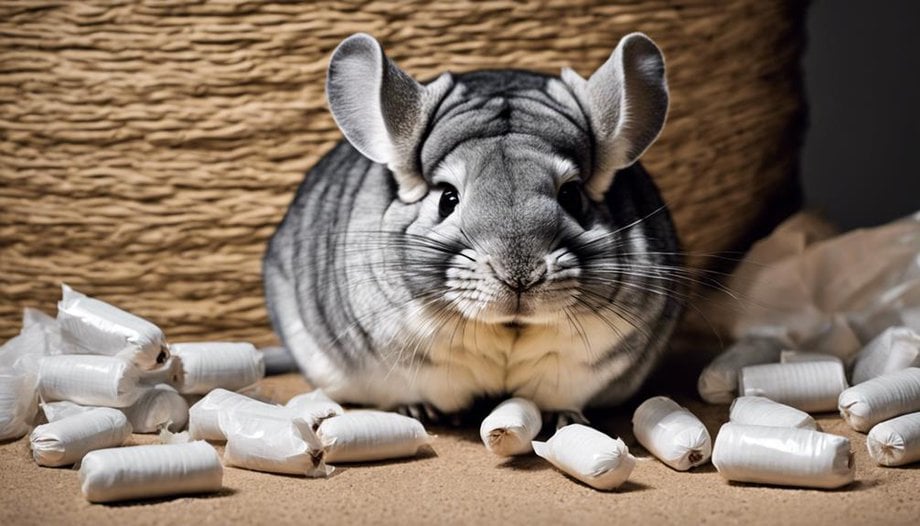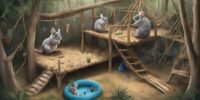What Are the Dangers of Overfeeding Pellets to Chinchillas?

Dangers of overfeeding chinchillas pellets include digestive issues, liver complications, and impacting their behavior and longevity.
Portion control and dietary balance are crucial for their well-being.
Moderation is key to safeguarding your chinchilla's health and happiness.
Digestive Issues
Overfeeding pellets to chinchillas can lead to severe digestive issues, jeopardizing their health and well-being. Proper weight management is essential for chinchillas to thrive, and this begins with their diet. Chinchillas have sensitive digestive systems, and an imbalance can result in discomfort and health complications. Ensuring their digestive health is vital in maintaining their overall well-being.
When chinchillas are overfed with pellets, they may consume excessive amounts of carbohydrates and fats, leading to weight gain and digestive disturbances. These issues can manifest in symptoms such as bloating, diarrhea, and even more severe conditions like gastrointestinal stasis. By carefully monitoring their pellet intake and providing a balanced diet rich in hay and limited pellets, you can promote healthy weight management and support their digestive system.
Obesity Risk
Beware the lurking danger of obesity in your chinchilla.
Excessive pellet consumption can lead to serious health issues that jeopardize your pet's well-being.
Implementing proper portion control is essential to safeguarding your furry friend's health.
Obesity Potential
Excessive consumption of pellets by chinchillas can greatly increase their risk of developing obesity, a condition that poses serious health concerns for these small mammals. Ensuring proper weight management for your chinchilla is essential in maintaining its overall health and well-being.
- Monitor Portion Sizes: Controlling the amount of pellets your chinchilla consumes is essential to prevent overeating.
- Incorporate Exercise: Providing opportunities for regular exercise is crucial for your chinchilla's health and weight management.
- Consult a Vet: If you notice signs of weight gain or obesity in your chinchilla, seek guidance from a veterinarian specializing in exotic pets to address the issue promptly.
Health Implications
Indulging your chinchilla with an abundance of pellets can lead to grave health consequences, particularly regarding obesity risk. Weight management is essential for the overall well-being of your furry friend.
Chinchillas are prone to obesity when overfed, which can result in a myriad of health issues. Obesity not only puts strain on their joints and bones but also impacts their digestive health. Excessive pellet consumption can lead to digestive problems such as bloating, diarrhea, and potentially fatal gastrointestinal stasis.
Maintaining a balanced diet is vital to prevent these health implications. By monitoring the quantity of pellets provided and ensuring a diet rich in hay and water, you can safeguard your chinchilla's weight and digestive system, promoting a healthy and happy life.
Portion Control Tips
To maintain your chinchilla's health and prevent obesity risks, it's imperative to carefully control the portions of pellets provided in their diet. Ensuring a healthy weight and overall well-being for your furry friend involves thoughtful consideration of their nutritional intake.
Here are some essential tips for effective portion control:
- Establish a Feeding Schedule: Create a consistent feeding routine to regulate the amount of pellets consumed daily.
- Monitor Weight Regularly: Keep track of your chinchilla's weight to detect any fluctuations early on and adjust their diet accordingly.
- Consider Pellet Alternatives: Explore options like a hay diet to supplement or replace pellets, offering a more fibrous and natural diet.
Dental Problems
Excessive pellet consumption can lead to serious dental issues in chinchillas. Tooth overgrowth poses a significant risk, potentially causing pain and discomfort for your furry companion.
Chewing difficulties may arise, affecting your chinchilla's overall health and well-being.
Tooth Overgrowth Risk
Be mindful of the risks associated with allowing chinchillas to consume an abundance of pellets, as this can lead to serious dental problems like tooth overgrowth. Ensuring proper dental care for your chinchilla is essential to prevent potential complications that may arise from overgrown teeth.
- Regular Veterinary Check-ups: Schedule routine check-ups with a specialized vet to monitor your chinchilla's dental health.
- Provide Chew Toys: Offer suitable chew toys to help naturally wear down your chinchilla's teeth.
- Balanced Diet: Maintain a diet rich in hay and limited pellets to support your chinchilla's nutritional needs and prevent tooth overgrowth.
Chewing Difficulties Arise
Should your chinchilla exhibit difficulties in chewing, it may indicate underlying dental problems that require prompt attention to prevent further complications. Dental care is vital for your chinchilla's overall well-being, as dental issues can lead to pain and discomfort, affecting their ability to eat properly.
Chinchillas have open-rooted teeth that continuously grow, and if not worn down correctly through chewing, overgrowth can occur, causing jaw health problems. Regular veterinary check-ups are essential to monitor your chinchilla's dental health and address any issues early on.
Ensuring a proper diet with adequate hay and limiting pellet intake can help prevent dental issues. By prioritizing dental care and monitoring your chinchilla's jaw health, you can promote their long-term health and happiness.
Nutrient Imbalance

Nutrient imbalance in chinchillas can lead to serious health complications if not carefully monitored and adjusted. As you care for these delicate creatures, it's essential to be mindful of their dietary requirements to prevent any adverse effects.
Here are three key points worth noting:
- Dietary Consequences: Overfeeding pellets can result in nutrient deficiency, depriving your chinchilla of essential vitamins and minerals necessary for their overall well-being.
- Health Risks: Imbalanced nutrition can pose health risks, impacting your chinchilla's immune system, growth, and organ function.
- Mineral Imbalance: Excessive pellet consumption may lead to a mineral imbalance, affecting bone health and causing issues like bladder stones.
Liver Complications
Shifting from the risks of nutrient imbalance, an overabundance of pellets in a chinchilla's diet can precipitate severe liver complications if not promptly addressed. Liver damage and metabolic issues are among the potential consequences of overfeeding pellets to your chinchilla. The liver plays an important role in processing nutrients and detoxifying harmful substances. When the liver is overwhelmed due to excessive pellet consumption, it can lead to liver damage. This damage can manifest in various ways, such as impaired liver function and fatty liver disease.
Metabolic issues may also arise from overfeeding pellets, impacting your chinchilla's overall health and well-being. The excess carbohydrates and fats from an imbalanced diet can strain the chinchilla's metabolism, potentially leading to obesity and related complications. To prevent these liver complications and metabolic issues, it's essential to provide a balanced diet consisting of hay, limited pellets, and fresh vegetables. Monitoring your chinchilla's food intake and ensuring they receive proper nutrition is crucial for their long-term health. Remember, a healthy chinchilla is a happy chinchilla.
Behavioral Changes

An excess of pellets in a chinchilla's diet can lead to notable behavioral changes, affecting their overall demeanor and interaction patterns. When your furry friend consumes too many pellets, it can disrupt their natural balance, resulting in shifts that may concern you.
Here are some behavioral changes to watch for:
- Activity Levels, Weight Gain: Overfeeding pellets to your chinchilla can lead to decreased activity levels and potential weight gain. You might notice your chinchilla becoming lethargic or less interested in their usual playtime activities. This change could indicate that their diet needs adjustment to prevent further health issues.
- Sleep Patterns, Energy Levels: Chinchillas are known for their energetic and playful nature. However, an overabundance of pellets can disrupt their sleep patterns and energy levels. If you observe your chinchilla being more lethargic during their active hours or having trouble sleeping, it could be linked to their diet.
Monitoring your chinchilla's behavior closely can provide valuable insights into their well-being, helping you make informed decisions about their diet and overall care.
Decreased Lifespan
Overfeeding chinchillas with an excessive amount of pellets can greatly shorten their lifespan, impacting their overall health and longevity. When chinchillas are fed an imbalanced diet due to overfeeding, they're at risk of developing nutritional deficiencies, leading to a myriad of health issues. Quality concerns regarding the pellets being given to chinchillas are vital, as poor-quality pellets may lack essential nutrients necessary for their well-being.
Metabolic disorders can arise from overfeeding, causing disruptions in their bodily functions and leading to severe health complications. Weight management is essential in ensuring the chinchilla maintains a healthy body condition, as obesity can markedly reduce their lifespan. By carefully monitoring their pellet intake and providing a balanced diet rich in essential nutrients, you can help prevent these detrimental effects on their health and longevity. Remember, the key to a chinchilla's longevity lies in proper nutrition and mindful feeding practices.
Frequently Asked Questions
Can Chinchillas Safely Consume Other Types of Food Besides Pellets?
Safely consume other foods besides pellets? Absolutely! A balanced hay diet with occasional vegetable treats can enrich a chinchilla's life. Remember, variety is the spice of life, even for these little furballs. Enjoy exploring new flavors!
Are There Any Specific Pellet Brands That Are Recommended for Chinchillas?
When choosing pellet brands for your chinchilla, focus on quality ingredients, like timothy hay and essential nutrients. Opt for reputable brands known for providing nutritional benefits. Remember, the right pellets play an essential role in your chinchilla's well-being.
How Often Should Chinchillas Be Fed Pellets?
For best health, feed your chinchilla pellets in small portions daily to meet their nutritional needs. Supplement with hay to aid digestion. Remember, balance is key—avoid overfeeding to prevent potential health risks.
What Are Some Signs That a Chinchilla May Be Suffering From Overfeeding?
When overfeeding, watch for weight gain and bloating, signs of digestive issues. If lethargy sets in, cut back on pellets. Show love by monitoring portions, ensuring your chinchilla thrives with a balanced diet.
Are There Any Alternative Feeding Options for Chinchillas Besides Pellets?
When it comes to feeding your chinchilla, remember this: variety is the spice of life! Consider incorporating a hay diet alongside pellets for best nutrition. Treat options like dried fruits or herbs can also provide enrichment.











